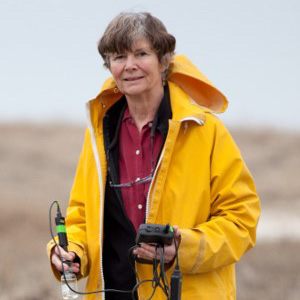Anne Giblin is a Senior Scientist in the Ecosystems Center at the Marine Biological Laboratory. She received a B.S. degree from Rensselaer Polytechnic Institute, her Ph.D. (1982) in Ecology from the Boston University Marine Program and spent two years as a Post-Doctoral Investigator at the Woods Hole Oceanographic Institution. Her major research interest has been on the cycling of elements in the environment, especially the biogeochemistry of sulfur, iron, nitrogen, and phosphorus. Much of her work has been focused in soils and sediments where she has examined element cycling under different conditions of oxidation and reduction. Her research on the nitrogen cycle has been centered on understanding how ecosystems respond to high nutrient inputs from wastewater and fertilizer. She currently directs the Plum Island Ecosystems Long-Term Ecological Research site.
Marshes must keep up with sea-level or drown. The rate of sea-level rise is accelerating and there is concerns that marshes may not be able to keep up. Even if marshes survive, they may lose area or lose certain habitat types (for example the higher marsh) that are critical to some species. There is great interest in the management community in understanding the controls on sediment accretion in marshes and in being able to predict the limits of marsh accretion. Managers also want to know if some possible interventions, like hydrologic alteration or thin layer sediment deposition will be effective. We will discuss data from Plum Island on the controls on marsh accretion and on interventions that may be worth further consideration.

Support the people who manage our natural areas and protect biodiversity in perpetuity.